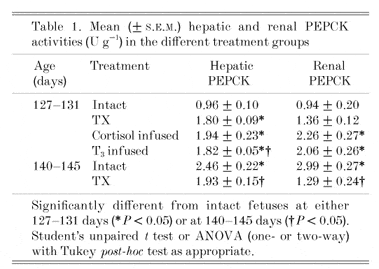In fetal sheep, the prepartum rises in hepatic and renal PEPCK activity are dependent on the fetal cortisol surge towards term (Fowden et al. 1993). This cortisol increment also stimulates deiodination of thyroxine (T4) to triiodothryronine (T3) in utero (Fraser & Liggins, 1989) although the extent to which T3 mediates the maturational effects of cortisol on tissue PEPCK activity remains unknown. Hence the present study examined the effects of fetal thyroidectomy (TX) and T3 infusion on hepatic and renal PEPCK activities in fetal sheep near term.
All procedures accorded with UK legislation. All surgery (TX and intravascular catheters) was carried out under halothane anaesthesia (1.5 % in O2 and N2O). Tissues and umbilical arterial blood samples were collected from the following groups of fetuses after maternal euthanasia (200 mg kg-1 sodium pentobarbitone I.V.): (1) intact fetuses at 127-131 days (n = 7, infused I.V. with saline for the previous 5 days) and 140-145 days (n = 7, term 145 ± 2 days), (2) fetuses thyroidectomized at 105-110 days and delivered at 127-131 days (n = 8) and 140-145 days (n = 9) and (3) intact fetuses infused I.V. with cortisol (2-3 mg kg-1 day-1, n = 7) or T3 (8-12 mg kg-1 day-1, n = 5) for 5 days before tissue collection at 127-131 days. Fetuses were killed humanely with a lethal dose of sodium pentobarbitone (200 mg kg-1). Total tissue PEPCK activity was measured by 14C incorporation into malate (Fowden et al. 1993). Plasma cortisol, T3 and T4 were measured by RIA validated for ovine plasma.
The normal ontogenic increases in hepatic and renal PEPCK activities were abolished when the prepartum rise in plasma T3 but not cortisol was prevented by TX (Table 1). At 140-145 days, fetal TX suppressed PEPCK activity in both liver and kidney while, at 127-131 days, hepatic PEPCK activity was greater in TX than intact fetuses (Table 1). In cortisol-infused fetuses, hepatic and renal PEPCK activities were greater than those in intact fetuses at the same gestational age and were similar to the values in intact fetuses near term (Table 1). After 5 days of T3 infusion, hepatic and renal PEPCK activities were greater than in intact controls but only renal activity was increased to values similar to those seen in intact fetuses near term (Table 1).
In fetal sheep, thyroid hormones are important for the normal ontogenic rises in hepatic and renal PEPCK activity near term and may mediate, in part, the maturational effects of cortisol.

